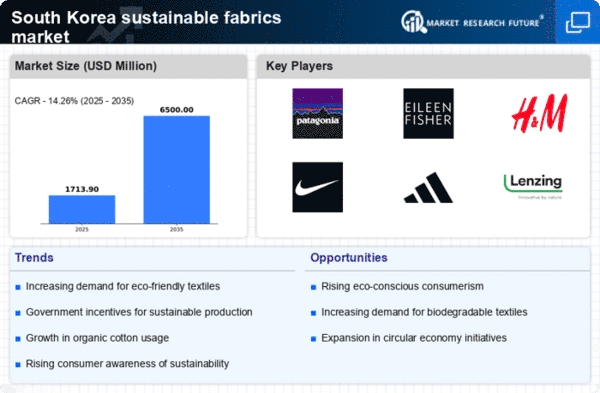The South Korea Sustainable Fabrics Market has been experiencing significant growth due to the escalating awareness surrounding environmental sustainability and the demand for eco-friendly textiles. This market is characterized by various players who are incorporating innovative practices and materials to meet consumer preferences for sustainable options. As customers become increasingly conscious of the environmental impact of their clothing choices, companies are competing to offer high-quality, sustainable fabrics that align with these values. The competitive landscape consists not only of established textile manufacturers but also innovative startups that are capitalizing on new technologies and techniques for fabric production.
The ongoing transformation in consumer habits alongside governmental support for sustainable initiatives is fostering a vibrant market dynamic, compelling participants to enhance their offerings and strengthen their positioning.In the realm of the South Korea Sustainable Fabrics Market, KUALA has carved a niche for itself by focusing on ethically sourced materials and environmentally friendly production methods. The company stands out due to its strong commitment to sustainability, employing practices that minimize waste and promote resource efficiency throughout its manufacturing processes.
KUALA's robust product line consists of a diverse range of sustainable fabrics that cater to various sectors, including fashion, home textiles, and activewear. The brand has built a respectable market presence, gaining recognition for its transparency and dedication to social responsibility. KUALA's commitment to quality, coupled with its ability to innovate and adapt to changing consumer demands, distinctly positions it as a frontrunner within the sustainable fabrics segment in South Korea.EcoKnit has also established a successful foothold in the South Korean Sustainable Fabrics Market with its unique approach to knitted textiles made from sustainable sources.
The company specializes in a range of eco-friendly knitted fabrics suitable for multiple applications, including apparel and outdoor gear. Its key offerings emphasize durability while minimizing environmental impact, making EcoKnit a preferred choice for brands looking to combine functionality with sustainability. The company has engaged in strategic partnerships and collaborations aimed at expanding its market reach and enhancing its product offerings. Its focus on innovation is noteworthy, as EcoKnit continually invests in research and development to create new fabric technologies that adhere to sustainable practices.
This forward-thinking approach, combined with a strong dedication to sustainability, has enabled EcoKnit to reinforce its market presence and attract environmentally conscious consumers and businesses in South Korea.


















